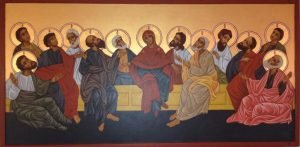 Our readings for this week are taken from Paul’s letter to the Colossians and Luke’s Gospel. Our Epistle reading tells us that, because we are God’s chosen ones, we should clothe ourselves in virtue. Paul then articulates a number of virtues that we should embrace, ending with this exhortation: “Let the word of Christ, dwell in you.” He tells us indirectly that Christ taught us that it is a virtuous life that allows us to grow in our likeness of God. The virtues that Paul writes about are mercy, kindness, humility, meekness, patience, forgiveness, thankfulness and love. He also clearly indicates that if we attempt to make these virtues a real part of our lives, we will achieve true, interior peace.
Our readings for this week are taken from Paul’s letter to the Colossians and Luke’s Gospel. Our Epistle reading tells us that, because we are God’s chosen ones, we should clothe ourselves in virtue. Paul then articulates a number of virtues that we should embrace, ending with this exhortation: “Let the word of Christ, dwell in you.” He tells us indirectly that Christ taught us that it is a virtuous life that allows us to grow in our likeness of God. The virtues that Paul writes about are mercy, kindness, humility, meekness, patience, forgiveness, thankfulness and love. He also clearly indicates that if we attempt to make these virtues a real part of our lives, we will achieve true, interior peace.
Our Gospel story is about Christ’s encounter with one of the “ruling class” who wants to know what he must do in order to “share in everlasting life.” Jesus’ response to the man is that first he must keep the basic commandments that involve true love of neighbor. Jesus does not indicate the ten commandments of Moses but highlights those which guide us in our relationships with others (i.e., adultery, murder, stealing, lying and lack of respect for others).
After the man declares that he has kept these basic commandments, Jesus tells him that if he really wants to spiritually grow, he must “sell all you have and give to the poor and then follow me.” The Gospel then tells us that when Jesus said this the man grew “melancholy” because he was rich. Jesus ends the encounter with the man by responding to the questions of others who had heard this and then asked: “Who, then, can be saved?” To which Jesus replies, “Things that are impossible for men are possible for God.”
So what message can we derive from these two readings? When you think about the story of the man from the ruling class, you realize that Jesus is telling us that if we become concerned about the things we have. spiritual growth is impossible. But, if we enlist the help of God and attempt to make virtue a part of your life, you can achieve the fullness of life. Things of this world can distract us from the primary task of life, namely to learn how to love our neighbors as ourselves and not to think about worldly things but, rather, about spiritual things. All things are truly temporary. We must learn what is important in life, things or others. We have a choice! How do we live our lives? That’s the question
